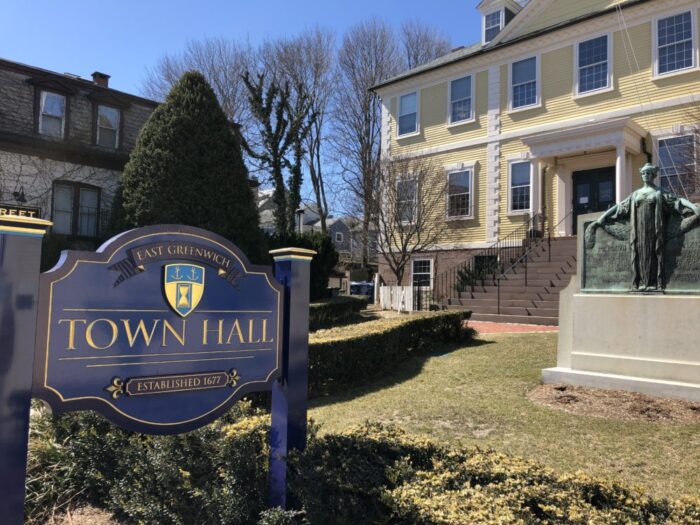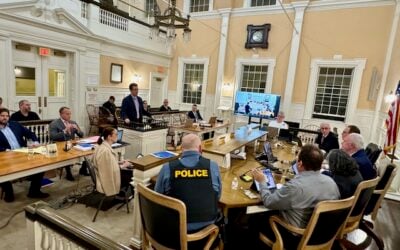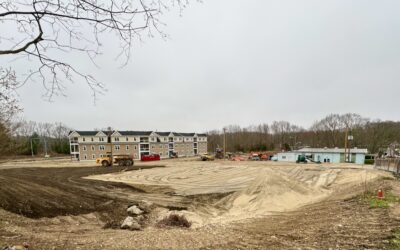And the post-pandemic future of virtual meetings
Many of us have gotten used to virtual calls and meetings one year into the COVID-19 pandemic, but the sessions have not been without their issues, from technical difficulties to personal behavior to harassment through comments.
So what is the consensus about virtual decorum for East Greenwich officials?
“Act as if you were there in person,” Town Solicitor Andy Teitz said at Monday night’s Town Council meeting. “Don’t do anything on the screen that you wouldn’t do in person. That’s kind of the golden rule here.”
When then-Gov. Gina Raimondo enacted an executive order last March allowing municipalities to hold public meetings over Zoom, it was a government necessity to avoid spreading the coronavirus and a move replicated across the country. But virtual meetings have not been without their issues, big and small. A lighthearted example of this happened in February, when a Texas lawyer accidentally put on a cat filter at a virtual court hearing, much to the eventual amusement of the entire country.
Certain incidents have had larger impacts, however. In East Greenwich last month, Kristen Carron of the Historic District Commission was criticized by an applicant for finishing a glass of wine at the start of a meeting. The applicant, developer Gerry Zarrella, captured the moment in a screenshot that he later shared on social media, calling for her removal. While the meeting continued for another four hours with no signs of impairment from Carron, she has since resigned from the board.
People have also abused Zoom chat functions to stir unrest, including at East Greenwich High School when a chat room was hit with racist comments during a Q&A between students and a guest actor who was Black. Town meetings do not allow the chat function, although viewers are invited to speak during public comment.
Teitz explained that as public servants, paid or volunteer, officials at virtual municipal meetings owe the public a respectful demeanor. While Teitz said some people don’t think being overly formal over a video call is necessary, he argued that certain actions and comments virtually may come across differently compared to during in-person meetings.
“As we pointed out, emotions often get changed over the computer,” Teitz explained. “Something that would seem as just good-natured ribbing in person can sometimes be seen as harassment or sarcasm when it’s over a computer screen like that. So it’s important to be aware of that and always take the more formal approach.”
In Teitz’s memorandum to the town, he wrote that basic Zoom etiquette rules include asking for a recess if you need to use the bathroom, eat or tend to other needs in your home, to dress professionally and sit in an office setting if possible. The memorandum additionally asked public officials to learn how to properly mute themselves and turn off their cameras when needed, avoid filters or over-the-top backgrounds and remember that anything they do over a virtual meeting will be public and potentially widely viewed online. Teitz suggested holding practice meetings over Zoom for people who may be new to the technology, as well as practice professional video calling etiquette.
“The ability of allowing a lot of people both in the public and members of boards and commissions who would otherwise not have the opportunity to participate outweighs a lot of the frustration,” Teitz said.
Councilwoman Caryn Corenthal asked about the future of online meetings even after the pandemic. Teitz said there has been no consensus on the matter as of yet, but there has been discussion. He said that from a practical perspective when everyone is vaccinated fully in-person meetings can resume, but there has been debate about if it’s appropriate to allow people to participate remotely regardless. He also explained that amendments to the Open Meetings Act will ultimately have an impact.
Corenthal, who called in from New Jersey that night, supported allowing constituents to access meetings remotely, arguing that it allows people to leave early if they need to and she noted it could be more convenient for certain people, such as parents who are unable to find a babysitter. She said this would make the process of governing more democratic.
Teitz said the League of Cities and Towns currently opposes permanently online/in-person hybrid town meetings for two reasons. The first is that smaller communities argue they cannot afford the technology and staffing needed for these sort of meetings. The other reason is that some officials think citizens should make an effort to participate in public meetings, and to make these meetings online would not be fair to those who did attend in person.
However, Town Manager Andy Nota generally appeared open to the idea of hybrid meetings.
“I think we will migrate back to more of a hybrid where we do have people in the audience that want to be there and feel it provides them with more of a presence,” Nota said. “But I think the ease of access and the ability to participate from a remote location is something that I think across the country we’ve seen, in some cases, good and others would argue that it hasn’t always been good when some infiltrations of the systems in an inappropriate way occur. But I think overall, larger participation is good.”






 Subscribe
Subscribe
I submitted this to the Town Council and RIDBR after the discussion referenced above.
Hello Town Councilors, Rep. Caldwell, and Town Solicitor, I heard pieces of a discussion regarding using a virtual platform, like Zoom, for holding open meetings in the future as the COVID restrictions are lifted.
If I understand correctly, some organization/the League of Cities and Towns/ RIDBR is in the discussion stages. How does the public access this group and weigh in? What demographic do most of this group’s members belong to (e.g. are they mostly affluent, older, white men?) Are disability reps present? Racial diversity? Those representing the elderly? The poor? Constituents at all?
When I spoke publicly at a past TC meeting about diversity work and systemic racism, abeism, classism – this is one of those pivotal moments. Are we going to reinstitutionalize barriers to equity that we have hsppened upon solutions to or are we going to embrace what we have learned permits broader reach and engagement?
The League’s concerns were, if I may be sassy, laughable. I literally laughed. So my disabled nonverbal ten year old has to use zoom, but a town needs a tech role? Give me a break. It’s not hard and every other profession has had to make the same leap so municipalities don’t get to claim unfair obstacle. It doesn’t require a tech person.
The second concern was thinly veiled (and I will call it out) descrimination: They don’t want the voice of those who “didn’t have to make the effort to attend the meeting in person”??! So they only want the voice of affluent, able bodied and mind, not caregivers or parents or the poor, without transportation, etc. Attending an online meeting still requires effort.
My attendance, as a caregiver of two disabled individuals, at a meeting face to face is not the same ask as it is for others. This argument against virtual meetings treats us like all constituents have identical privilege and identical challenge which is obviously not true. Those who have the power to make this decision are making a biased call because the do not want to broaden the availability that seems the very essence of open meetings laws!
I ask that you all, as people I voted for, consider my feedback to hopefully not wait passively while others get the ball moving backwards towards systemic descrimination. I hope we will insist on empowering a broad constituency to have voice in appreciation of our diversity and our ethical obligation to hold open meetings.
Thank you,
Nicole